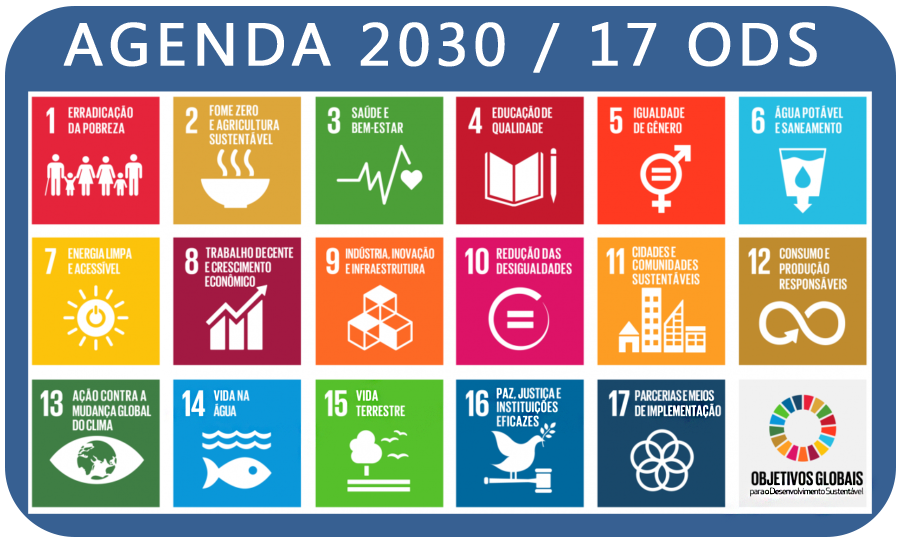In 2015, the United Nations General Assembly approved the 2030 Agenda for Sustainable Development as a way to promote actions that eradicate poverty, protect the environment and the climate, and ensure peace and prosperity for all people. The FURG Postgraduate Program in Aquaculture (PPGAq) had no difficulties in adapting to the proposals of Agenda 2030, since, since its foundation, it has directed its efforts towards projects directly related to the Sustainable Development Goals (SDGs).
The history of the PPGAq, materialized in its various Dissertations, Theses and scientific publications, is in line with several of the goals proposed by Agenda 2030, but especially in the SDGs highlighted below.
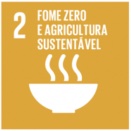 ODS 2. Zero hunger
ODS 2. Zero hunger
Increase the productivity and income of small producers, particularly women, indigenous people, family farmers, and fishermen, including through opportunities to add value and employment;
Ensuring sustainable food production systems and implementing resilient practices, which increase productivity and production, which help to maintain ecosystems, and which strengthen the capacity to adapt to climate change;
Maintain the genetic diversity of domesticated and wild species, including through the development of conservation techniques (cryopreservation) that allow the formation of germplasm banks.
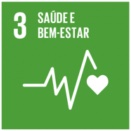 ODS 3. Good health and well-being
ODS 3. Good health and well-being
Substantially reduce the number of deaths and diseases due to dangerous chemicals, contamination and air and water pollution.
Develop pathogen-free cropping systems and ensure a healthy final product;
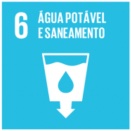 ODS 6. Clean water and sanitation
ODS 6. Clean water and sanitation
Protect and restore water-related ecosystems, including mountains, forests, wetlands, rivers, aquifers and lakes;
Expand international cooperation and support for capacity building for developing countries in activities and programs related to water and sanitation, including water collection, desalination, water efficiency, wastewater treatment, recycling and technologies reuse.
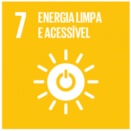 ODS 7 - Affordable and clean energy
ODS 7 - Affordable and clean energy
Substantially increase the share of renewable energies in the global energy matrix.
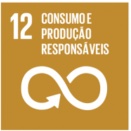 ODS 12 – Responsible consumption and production
ODS 12 – Responsible consumption and production
Reduce food losses along production and supply chains, including post-harvest losses;
Achieve environmentally sound handling of chemicals and all residues, throughout their life cycle, and significantly reduce their release into air, water and soil, to minimize their negative impacts on human health and the environment.
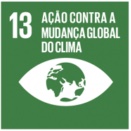 ODS 13 – Climate action
ODS 13 – Climate action
Improve education, raise awareness and human and institutional capacity on mitigation, adaptation and impact reduction.
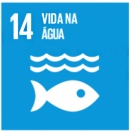 ODS 14 – Life below water
ODS 14 – Life below water
Prevent and significantly reduce marine pollution of all types, especially from land-based activities, including marine debris and nutrient pollution;
Manage sustainably and protect marine and coastal ecosystems to avoid significant adverse impacts, including through strengthening their resilience, and take measures to restore them, in order to ensure healthy and productive oceans;
Increase economic benefits for developing and least developed countries through the sustainable use of marine resources, including through sustainable management of fisheries, aquaculture and tourism;
Increase scientific knowledge, develop research capacities and transfer marine technology in order to improve the health of the oceans and increase the contribution of marine biodiversity to the development of developing and least developed countries;
Ensure the conservation and sustainable use of the oceans and their resources by implementing international law, in accordance with the United Nations Convention on the Law of the Sea, which provides the legal framework for the conservation and sustainable use of the oceans and their resources.
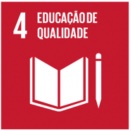
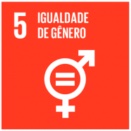 PPGAq's activities and actions also demonstrate alignment with SDGs 4 (Quality education) e 5 (Gender equality).
PPGAq's activities and actions also demonstrate alignment with SDGs 4 (Quality education) e 5 (Gender equality).
PPGAq seeks to ensure inclusive, equitable and quality education. For this to happen, freedom of thought and expression are fundamental values, and they must be exercised within an environment of mutual respect, regardless of race, disability, religion, gender or sexual orientation. With this in mind, the PPGAq works to eliminate gender disparities and ensure equal access and professional training. All PPGAq student selection processes respect the minimum reserve of 20% of vacancies for black, indigenous, quilombola and disabled students, according to the FURG Graduate Affirmative Action Program (Resolution 004/2019 from CONSUN-FURG) .
Regarding gender equality, until April 2021, when this text was last updated, the PPGAq had 271 graduates, most of whom (136) were women. The trend of maintaining the gender balance among graduates remains, since, in April 2021, the PPGAq had 41 students and 30 students enrolled.
PPGAq also stands out in the following goals proposed by SDG 4:
Substantially increase the number of young people and adults who have relevant skills, including technical and professional skills, for employment, decent work and entrepreneurship;
Ensure that all students acquire the knowledge and skills necessary to promote sustainable development, including through education for sustainable development;
Increase the contingent of qualified teachers, including through international cooperation for teacher training, especially in the least developed countries.

